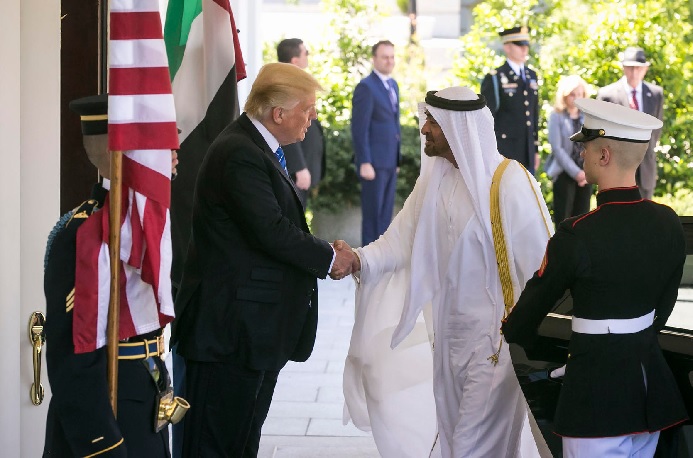
The “Abraham Accords” shift the regional landscape and offer new questions about paths ahead for Israeli-Palestinian and Arab-Israeli peace.
On August 13, the governments of Israel and the United Arab Emirates (UAE) announced that they had agreed to the full normalization of relations, in exchange for Israel suspending announced plans to annex large areas of the Palestinian territories. Dubbed the “Abraham Accords,” this agreement between Israel and the UAE—if fully implemented—would be the first Arab-Israeli reconciliation of its kind since the 1994 Israeli-Jordanian peace treaty, and stands to prevent, at least temporarily, Israeli-Palestinian and even broader regional deterioration that could have ensued in the wake of Israeli unilateral annexation. USIP’s Robert Barron looks at how the agreement came to fruition, what the United States’ role was, and what this means for the Israeli-Palestinian peace process and Israel’s relations with the Arab world at large.
What are the details of the Abraham Accords, and what led to the agreement?
The Thursday announcement stated that Israel and the UAE had agreed to a “full normalization of relations,” rather than a formal peace treaty. Per the joint U.S.-Israeli-UAE statement, in the coming weeks Israeli and Emirati delegations will meet “to sign bilateral agreements regarding investment, tourism, direct flights, security, telecommunications, technology, energy, healthcare, culture, the environment, the establishment of reciprocal embassies, and other areas of mutual benefit.” The timeline for this process is not yet clear, with UAE officials stating that “talks will start” in the coming weeks to implement normalization. The Trump administration has trumpeted the economic and security benefits of the agreement, and it hopes that the expected accords will be a step toward further normalization and regional peace.
The Abraham Accords come after months of debate over Israeli government plans to annex portions of the West Bank, with accompanied concerns that such a move would prevent a mutually agreed two-state outcome to the Israeli-Palestinian conflict from ever becoming possible. The Trump administration’s January 2020 “Peace to Prosperity Vision to Improve the Lives of the Palestinian and Israeli People” outlines areas of the West Bank to be ceded to Israel, and initially the administration seemed ready to allow Israel to unilaterally annex those territories without engaging in negotiations with the Palestinian Authority (PA) or offering any concessions in return. The August 13 Israeli-Emirati announcement states that Israel will suspend such annexation—the Emiratis incentivizing Israel to forego a step which could harm the prospect of a two-state solution—but details on the agreement’s timeframe, definition of annexation, or next diplomatic steps and aims remain undefined. Prime Minister Netanyahu has already announced that annexation has merely been “postponed,” and reasserted his intention to follow through on the promise to “apply Israeli sovereignty in parts of the West Bank.”
Did the United States play a role in brokering the deal?
Since coming into office in 2017, the Trump administration has prioritized improving Israel’s relations with the Gulf as a part of its regional security agenda (particularly the effort to counter Iran) and its effort to resolve the Israeli-Palestinian conflict. President Trump’s national security and Israeli-Palestinian conflict teams have built strong relationships with Emirati Crown Prince Sheikh Mohammed bin Zayed and Saudi Crown Prince Mohammad bin Salman, as well as openly encouraged security, economic, cultural, and public health cooperation between Israel and the Arab Gulf countries—and both the Israeli and Emirati leaders credited the current administration for the development. These efforts follow years of quietly growing relations between Israel and certain Gulf states, particularly the UAE, and efforts by prior U.S. administrations to leverage the opportunity toward an Israeli-Palestinian breakthrough.
The announcement—released following a joint call between President Trump, the Emirati crown prince and the Israeli prime minister—describes the agreement as a step toward the creation of a new “Strategic Agenda for the Middle East to expand diplomatic, trade, and security cooperation. Along with the United States, Israel and the United Arab Emirates share a similar outlook regarding the threats and opportunities in the region, as well as a shared commitment to promoting stability through diplomatic engagement, increased economic integration, and closer security coordination.” There are rumors that other Gulf states, such as Bahrain, may follow the UAE in normalizing relations.
What does this mean for Israel’s relationship with the broader Arab world?
Contact between Arab states and Israel was long considered taboo for the Arab world. The 1967 Arab League Summit agreed to “three no’s”—no peace with Israel, no recognition of Israel, no negotiations with Israel—which held for decades. Most Arab states continue to refuse any relations with Israel until the Palestinian issue is resolved. Since 1979, Israel has had a peace treaty with Egypt, and since 1994, has been at peace with Jordan, although these have not developed into warm relations between the respective societies. For years, Israel has had indirect contact around mutual interests with a number of Arab states, and at times contact has been public—for example, Israeli representation at regional sporting or cultural events, or Prime Minister Netanyahu’s visit to Oman in October 2018—as well as formalized, such as Israeli-Qatari trade relations between 1996 and 2000.
Per the August 13 White House joint statement, “Israel will suspend declaring sovereignty over areas outlined in the President’s Vision for Peace and focus its efforts now on expanding ties with other countries in the Arab and Muslim world. The United States, Israel and the United Arab Emirates are confident that additional diplomatic breakthroughs with other nations are possible, and will work together to achieve this goal.” Israelis have long sought to improve regional relations, particularly around security and trade issues. Expansion of commercial, security and other ties noted above can be expected to proceed in the near term; hopes for extensive normalization or people-to-people exchange, on the other hand, may be overly optimistic until the Palestinian issue is addressed.
How the Abraham Accords will affect Israel’s relations with the Arab world is still unclear. The Egyptian and Bahraini governments quickly lauded the announcement that Israel would cease annexation moves. However, the Palestinian Authority firmly rejected the announcement, described it as undermining the Saudi-led Arab Peace Initiative—which since 2002 has offered a normalization of relations between Arab states and Israel in exchange for a two-state resolution of the Israeli-Palestinian conflict—and is calling for Arab governments to reject the Emirati decision, similar to the Arab League Foreign Ministers Summit which unanimously rejected the Trump administration’s plan in February 2020.
What are the implications for the Israeli-Palestinian peace process?
Thus far, how the accords will directly affect the prospects of Israeli-Palestinian peace negotiations is unclear. However, that this agreement was reached without direct connection to progress on the Israeli-Palestinian conflict (and without the Palestinians’ awareness) has important implications in itself.
Immediately following the announcement, Israeli Prime Minister Benjamin Netanyahu held a press conference in which he said that he remained committed to applying sovereignty to areas of the West Bank, but that this agreement and American pressure would put those plans on hold. Netanyahu is weathering some of his roughest months as prime minister with a COVID outbreak, stagnant economy, 20 percent unemployment, ongoing legal battles and calls for his resignation, and a shaky coalition with the Blue and White Party. Netanyahu is already facing objections from right-wing proponents of annexation, while it seems he also may have isolated his coalition partners—Defense Minister Benny Gantz and Foreign Minister Gabi Ashkenazi were reportedly not informed of the agreement until it was publicly announced.
While the Emirati government framed the step as positive in preventing annexation and representing a “roadmap” for resolving the conflict, the Palestinians seem to have been caught off guard by the announcement, and have characterized it as a betrayal. Immediately following the announcement, Palestinian President Mahmoud Abbas called for a meeting of Palestinian leadership, including the Fatah central committee and PLO Executive Committee. The Palestinian Authority in the West Bank and Hamas leadership in Gaza issued complete rejections of the Emirati decision, with the PLO withdrawing its ambassador to Abu Dhabi and calling for an Arab League and Organization of Islamic Cooperation (OIC) summit to reject the announcement. The step may further isolate the Palestinians from powerful regional players in the UAE and United States. The Palestinian Authority has had a strained relationship with the UAE for nearly a decade, but Arab governments’ unwillingness to engage Israel until Palestinian statehood is achieved has been an important point of leverage. The Palestinian fear is that moves like this, if not conditioned on significant Israeli steps toward enabling the creation of a Palestinian state, debilitate the Palestinian national project.
In response to the Israeli moves toward annexation in line with the Trump administration plan, the Palestinian Authority has suspended all civilian and security coordination with Israel since May, resulting in deteriorating conditions on the ground and deepening financial difficulty for the PA and the Palestinian private sector, including the loss of monthly tax transfers that comprise more than 60 percent of PA revenue and the inability of Palestinian security forces to effectively enforce regulations to control the spread of COVID-19 in Palestinian communities. It is not yet clear whether the mixed message of the U.S.-Israeli-UAE statement declaring that Israel will suspend annexation plans and Prime Minister Netanyahu then stating that he remains committed to such annexation, albeit at a later date, will enable a formula for resumption of Palestinian-Israeli coordination.
 Eurasia Press & News
Eurasia Press & News


